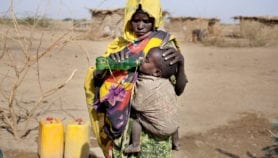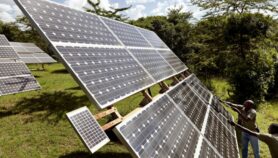Send to a friend
The details you provide on this page will not be used to send unsolicited email, and will not be sold to a 3rd party. See privacy policy.
Effective adaptation strategies will require reliable scientific data both on the nature of climate change and on its potential impact.
It is now widely accepted that despite developing countries’ lack of responsibility for human-induced global warming, they are likely to be hardest hit, and that the hardest hit of all will be African countries.
Given their relatively low level of carbon emissions, there is little African countries can do to reduce the scale of the problems they are likely to face — that must be primarily the responsibility of the developed world. But there are practices that can, and indeed must, be pursued to mitigate the impact of climate change, in areas from food production to public health.
Recent years have seen increasing attention paid to adaptation strategies. Talking about adaptation is no longer seen as a political excuse for not taking stronger action to reduce emissions; it is now generally accepted as an essential component of virtually all areas of development assistance.
Yet there remains a danger that the complexity of successful adaptation strategies will be underestimated. Success will require more than judicious application of traditional small-scale farming techniques — however flexibly they may have responded in the past to changing weather conditions — or wider distribution of conventional medicines.
Adaptation strategies will require detailed knowledge of the changes that climate change is likely to produce, both regionally and, especially, nationally.
One of the biggest challenges African countries now face, in common with the rest of the developing world, is building the capacity to generate a proper scientific understanding of these changes, particularly if countries are to take ownership of and be fully effective in their responses to these changes.
Low priority
A set of articles published this week on the SciDev.Net website highlights, among other issues, key areas in which more data is required if adaptation strategies are to succeed. For example, Suad Sulamain, a health specialist in the Sudan, describes the need for reliable data on social and environmental factors that influence malaria transmission (see How is climate change shifting Africa’s malaria map?).
As Sulamain points out, collecting such data is essential both nationally and regionally if successful measures are to be taken to contain the expected spread of malaria in Africa in the next few years. International health agencies need to provide the support for data collection. At the same time, African researchers need to develop the skills required not only to collect and analyse the data, but also to interpret its significance for health policymakers.
The same is true for meteorological data. As many African governments are discovering, global climate models may be able to provide a broad-brush picture of the likely challenges. But they are of limited value in predicting the specific difficulties a particular country is likely to face — information that is essential if an appropriate response is to be developed and implemented.
Building regional models of climate change requires the maintenance of accurate weather records over long periods. Regretfully, and with a few welcome exceptions, many African countries still give low priority to the collection of such data.
There have even been allegations that in some cases where this data has been collected, government agencies have been reluctant to share it openly with scientists because of its potential commercial value.
Yet without such data the accuracy of local climate forecasts will inevitably be undermined, as will the effectiveness of subsequent adaptation strategies.
Again, if the international community is genuinely committed to enabling Africa to develop a long-term, sustainable response to climate change, enhancing the ability of the continent’s researchers to collect and share relevant data should be a high priority.
Urgent challenge
Advocates of adaptation strategies are entirely correct to emphasise that strategies need to be built from the bottom upwards. New farming or public health practices will not be adopted unless communities accept and understand that it is in their own interest to do so — just as African countries cannot be expected to adopt strategies to reduce their carbon emissions unless they are convinced that the strategies will not detract from their economic growth.
But that is no reason for failing to take a more scientific approach to adaptation. It is misleading to claim, as a group of major Northern environmental organisations did in a report last year, that building on the existing ability of communities to cope with climate change is "a greater and more urgent challenge" than improved weather forecasting.
Both are needed. Similarly, there is some truth in the allegation of environmentalists that certain countries, notably the United States and Australia, have been promoting technological responses to climate change as an alternative to adopting unpopular political measures, such as imposing carbon emission caps on their industries.
Nevertheless, science-based technologies also have an important role to play in effective adaptation strategies. The challenge is simultaneously to develop these techniques and to implement ways of ensuring their wide dissemination and adoption, to blend the technical and the political, not advocate one at the expense of the other.
David Dickson
Director, SciDev.Net













